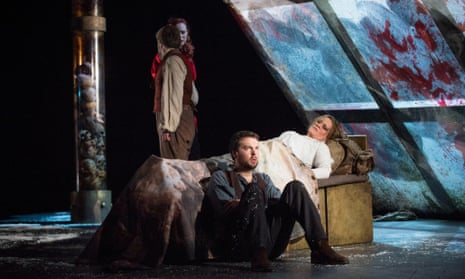Played in sparse but atmospheric sets by Florence de Maré, English Touring Opera’s new production of Puccini’s classic of romance and mortality in 19th-century Paris is clearly designed to withstand the rigours of touring, and will indeed visit 18 venues on its current run. But its very starkness accentuates the frustration of the grinding poverty that underlies the lives of its central characters and the death of one of them.
James Conway’s staging remains in period and makes no major narrative changes. Played by Dominic J Walsh, the toy-seller Parpignol becomes the puppeteer Pa’Guignol, which seems a harmless intervention; the excellent children’s chorus surrounding him in Hackney is from St Mary’s & St John’s CE School in Hendon, and local recruits will similarly be fielded for the other venues.
The main limitation of the production is a static quality, mostly evident in the Café Momus scene, which could do with more activity, but also in the horseplay between the flatmates, which seems a bit tentative.
Vocally, standards are remarkably high, with the exciting tenor David Butt Philip offering authentic Latinate tone as Rodolfo, ably seconded by Grant Doyle’s bluff and gruff Marcello. Ilona Domnich brings genuine fragility to Mimì and gives her a clean, lyrical line. Sky Ingram’s Musetta is appealingly sung, but she needs to dominate the second act, where neither she nor Andrew Glover’s Alcindoro are scene-stealers as yet. Njabulo Madlala’s Schaunard is a little backward in coming forward, too, though Matthew Stiff makes a strong impression with his Colline, especially in his nobly delivered Coat Song. Adam Player’s Benoît hits the spot, as does the orchestra, which sounds larger than it is and conveys Puccini’s score with style under Michael Rosewell.

Comments (…)
Sign in or create your Guardian account to join the discussion